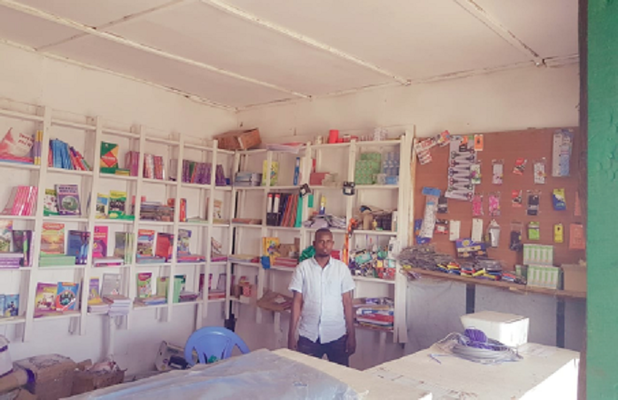
Feature Story: Digital Agents for Energy Project
Abdi Hussein is standing by the counter in his shop with books, stationery and small electronic goods in the Kakuma refugee camp in northwest Kenya. Abdi arrived in Kenya from Somalia when he was three years old, first in the Dadaab refugee camp where he grew up and studied business management before relocating to Kakuma, where he started his business four years ago:
"Life was very challenging for me, so I thought to start a business to sustain myself. I had to come up with an idea and did research for three months to find out what the community needed. I came to know that there were a lot of schools here but no bookstore or site where people can print," he says.
Abdi is one of the wholesalers of the Digital Agents for Energy+ (DA+) project in Kakuma, which targets local businesses and entrepreneurs from the refugee and host community. The project has identified small businesses to act as wholesalers of renewable energy products that are distributed through the entrepreneurs, referred to as digital agents.
"I saw the advert for this project to support youth in the camp. I had been thinking about selling solar panels, as I had ordered this for customers before, but did not have capital to start with this business. I saw the advert and thought it was a great opportunity," Abdi says. He explains how he has benefitted from the project even before the sales of the solar energy products have started:
"I am implementing some of the information from the training in my business now. Initially, I did not have any idea of that. For example, I record all the items that are sold daily and track the expenses. These things have really assisted me."
The Digital Agents for Energy+ Model
Funded by TRANSFORM, a joint initiative between the United Kingdom's Foreign, Commonwealth & Development Office (FCDO) and Unilever, the DA+ project is implemented in partnership between the International Trade Centre (ITC), Mastercard, Total, and the Norwegian Refugee Council (NRC).
As a market leader in digital payment solutions, Mastercard supports the project with a digital platform through which wholesalers and digital agents are trading solar energy products supplied by Total. Mobilization and on-ground coordination is carried out by the NRC, while ITC provides participants with entrepreneurship training and ongoing business mentorship.
The DA+ project was initiated via the Smart Communities Coalition (SCC), a public-private network that improves service delivery with innovative solutions focused on three pillars − energy, connectivity, and digital tools.
The SCC applies a market-based approach to support and build economies in contexts of displacement. The Coalition's 'ecosystem' approach is geared towards developing public-private co-design and co-implementation of interventions to advance new models for intervening in humanitarian settings.
With Mastercard as co-chair and NRC as an SCC member, ITC and Total were invited to a workshop in 2018. The actors co-created a Digital Agents model based on needs that were explored further with a market assessment.
Only 2.7 % of the population in Kakuma has access to energy. A thorough market assessment showed significant demand for durable energy products in the area. The project aims to meet this demand while driving financial inclusion and providing business development to strengthen small businesses and income-generating opportunities for young people.
The impact of the pilot is dual. First, it creates jobs and enables micro-entrepreneurs and local businesses to develops skills. At the same time, it brings access to energy to vulnerable communities in and around Kakuma by linking a large supplier based in Nairobi with local companies and entrepreneurs in the remote area.
Off-grid solar energy products showed great potential to thrive in the local market in Kakuma, linking supply and demand while empowering entrepreneurship. With the lessons learned from the project, we will explore the possibility of expanding the model to other sectors in need of new last-mile distribution strategies.
Developing Entrepreneurial Skills
To prepare for product sales, the wholesalers and agents have undergone product training delivered by Total, platform training delivered by Mastercard, and training in entrepreneurship, sales and business development delivered by ITC.
With this training, participants have become familiar with formal sales processes and product positioning while developing their skills as entrepreneurs.
"I did the trainings starting in February where we, for example, learned how to communicate with the customer," says Omot Ogut Odolla, a digital agent from the refugee community who was the first digital agent to make a sale.
"I was very excited when the first customer bought the small sunshine. I am a digital agent now. I advertize on the products and the price. I tell customers to look at the quality and warranty," he says, explaining how the communication skills he developed during training are essential to his work.
"We were a bit delayed because of Covid-19, but it is not a big challenge as long as we continue to communicate with our customers."
Sales have only just started and will continue through the project's duration, ending in early 2021. Until then, Omot and the other digital agents and wholesalers will receive ongoing support where needs arise to develop their entrepreneurial skills and businesses.



